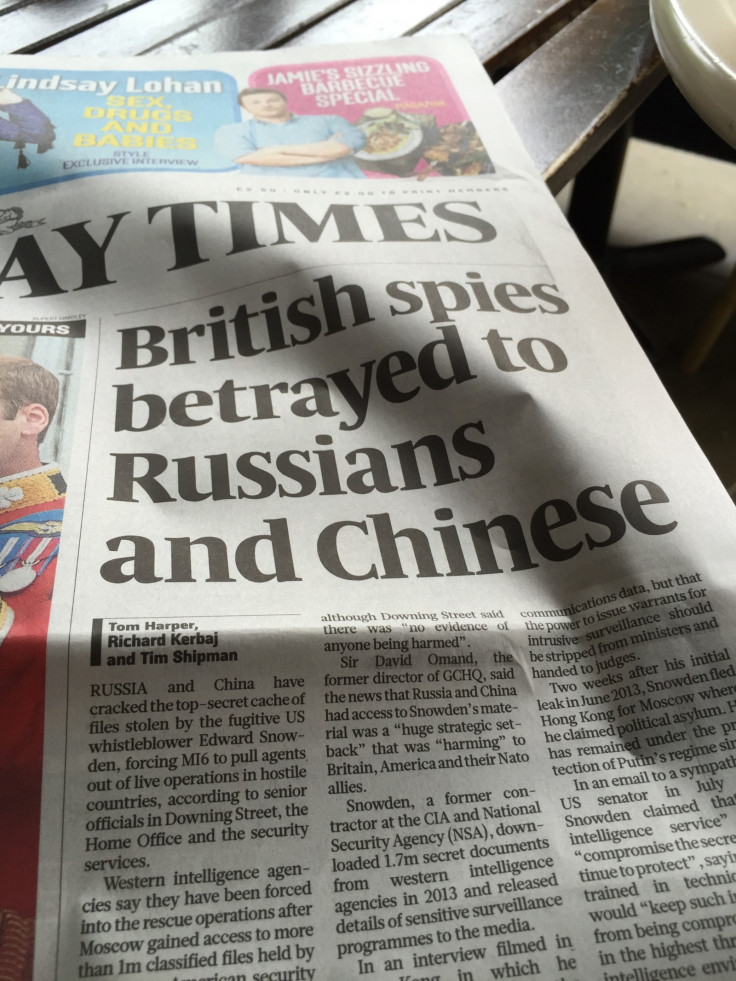Sunday Times defends Edward Snowden report criticised as 'the opposite of journalism'

Being a front page article on the Sunday Times will immediately give any story a significant level of credibility, which is why the splash story regarding Edward Snowden published on 14 June was so dangerous.
The story is available online (behind a paywall) and the full text has also been reproduced.
The article makes the startling claim that the huge cache of documents stolen by Snowden during his time as a contractor for the National Security Agency (NSA) has fallen into the hands of the Russian and Chinese governments and both had managed to "crack" the files, putting the lives of MI6 agents in danger.
It goes on to suggest Snowden may have given the files to Vladimir Putin's government in exchange for his asylum in Russia and that his time in Hong Kong after he fled the United States two years ago was contingent on the Chinese government being given access to the documents.
'Blood on his hands'
These are astonishing claims by any measure and to make them, the Murdoch-owned paper surely had lots of hard evidence to back them up?

Well, it appears not. The whole report is based on claims made by one anonymous government source at the Home Office (why not the Foreign Office which is responsible for MI6?), who claimed Snowden had "blood on his hands" for his alleged actions.
Even the most part-time Snowden-watcher would have immediately seen red flags raised when reading this report.
The complete lack of anything even remotely looking like evidence of these claims being true is enough to label this report as simply a press release for the Cameron government, which is looking to implement ever stricter surveillance laws.
Further evidence of the sketchiness of this report was seen hours after it was published when the Sunday Times quietly and without any indication of having done so, removed a line claiming David Miranda had met with Snowden in Moscow when he was detained at Heathrow carrying classified documents.
'The very opposite of journalism'
This was completely inaccurate and despite the Sunday Times apparently realising its mistake by removing the offending line from the online version of the article, it has not placed any indication on the website that it has made the change.
A spokesperson for News UK told IBTimes UK that "there was an error in the copy regarding Miranda travelling from Moscow, which was amended in the online article as soon as it was pointed out" adding there will be a correction printed in this Sunday's edition.
The claim Miranda was in Moscow first appeared in a Daily Mail report in September 2013 and was never corrected by that publication.
Describing the report as "the very opposite of journalism" Miranda's partner and the man who was central to the publication of the Snowden documents, Glenn Greenwald, has written a scathing review of the Sunday Times report.
The Sunday Times today merely recycled the same evidence-free smears that have been used by government officials for years – not only against Snowden, but all whistleblowers – and added a dose of sensationalism and then baked it with demonstrable lies. That's just how western journalism works, and it's the opposite of surprising.
When asked for a comment to this, a spokesperson for News UK defended the report, saying: "This story was responsible journalism and another example of The Sunday Times setting the news agenda.
"We reported what various reliable and well informed sources from within the government told us. We fully stand by our story, as did the BBC which also had it confirmed by government sources in its reporting yesterday."
Greenwald also points out many other publications — including Reuters, the BBC (albeit following its own briefing by an anonymous source) and (hands-up) IBTimes UK — mimicked the Sunday Times report without doing any due diligence and fact-checking the story for themselves.
Scrutiny
Charles Arthur, former technology editor at the Guardian, points out this is not the first time that scrutiny of Sunday Times reports have led to unanswered questions.
He said: "When I used to work Sunday shifts as a news reporter at The Independent, I often had to "follow up" stories that appeared in the Sunday Times. The problem was, as soon as you began trying to establish the facts they claimed, the stories fell apart – the claims didn't match reality."
The claims made in the Sunday Times report have been picked apart by those who have been deeply immersed in the Snowden story from day one.
Ryan Gallagher, a colleague of Greenwald's on The Intercept, has looked at the claims made in the report and flagged a number of crucial inconsistencies.
Regarding the claim that MI6 agents safety had been compromised, Gallagher says: "This was a surprise to me because I've reviewed the Snowden documents and I've never seen anything in there naming active MI6 agents.
"Were the agents pulled out as a precautionary measure? Keeping in mind that the UK government does not actually know exactly what Snowden leaked, how do these officials know there were documents in there that implicated MI6 operatives and live operations in the first place?"
Cack-handed attempt
Another journalist who has been covering Snowden's story since the beginning is Ewan MacAskill and he questions the timing of this report, suggesting it was a "cack-handed" reaction to the 373-page Anderson Report that was published earlier in June into the UK's surveillance laws:
"Anderson is scathing about the existing legal framework for surveillance, describing it as intolerable and undemocratic, and he has proposed that the authority to approve surveillance warrants be transferred from the foreign and home secretaries to the judiciary" adding "the issue is not going away and the Sunday Times story may reflect a cack-handed attempt by some within the British security apparatus to try to take control of the narrative."
The single line from the report that has been quoted by most critics of the piece highlights the complete lack of consistently in the piece:
"One senior Home Office official accused Snowden of having 'blood on his hands', although Downing Street said there was 'no evidence of anyone being harmed'."
As Greenwald points out, unless Snowden "cooked an extra-juicy steak", how can you say the whistleblower has blood on his hands when no one has been harmed?
© Copyright IBTimes 2024. All rights reserved.







